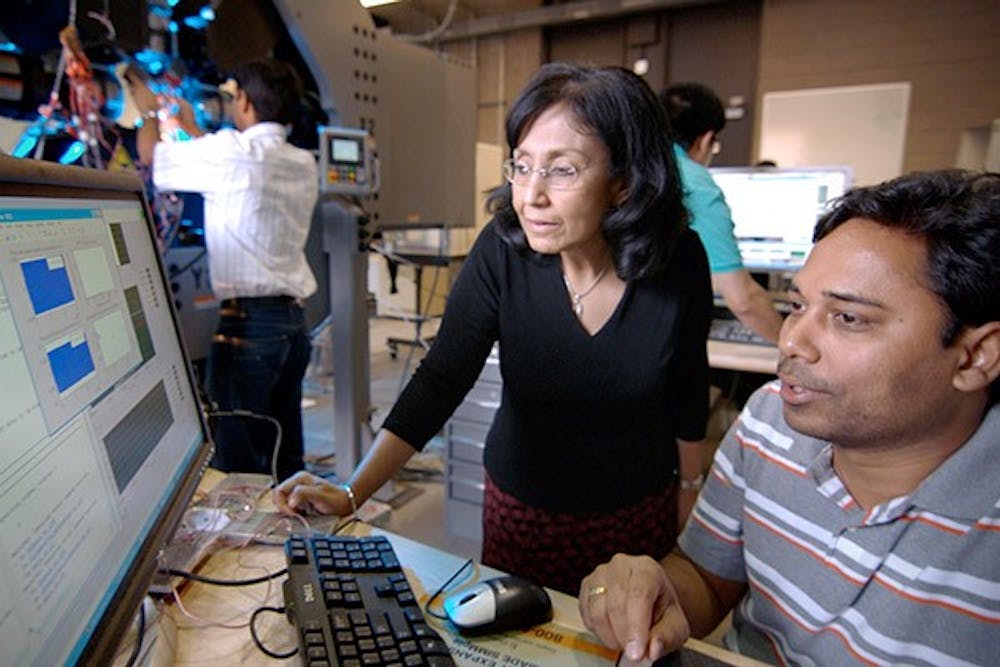 Rosa Krajmalnik-Brown, who works with the Center for Environmental Biotechnology in the Biodesign Institute, with a student. (Photo Courtesy of ASU's Office of Knowledge Enterprise Development)
Rosa Krajmalnik-Brown, who works with the Center for Environmental Biotechnology in the Biodesign Institute, with a student. (Photo Courtesy of ASU's Office of Knowledge Enterprise Development)Arizona’s three public universities, often known for their fierce rivalries in sports and academics, will more easily be able to work together through a new advanced research database called SciVal.
The program’s launch was announced earlier this month after more than a year of preparation by the Arizona Board of Regents. SciVal combines powerful, complex database technology with an accessible interface to help researchers across all three universities find others who are working on the same issues in order to increase collaboration, according to an ABOR press release.
ABOR chairman Rick Myers said SciVal will dramatically stimulate connections across disciplines and universities for both students and faculty, which is a crucial step to solving complicated issues.
“One of our primary goals with the three universities is to increase research, and our feeling is when you bring more competitive research to Arizona, more than just bringing those dollars, it helps to create ideas and spinout ideas and economic vitality,” he said. “If you look at research in today’s environment, some of the big problems that exist in the world that are trying to be solved require a cross-disciplinary approach. When we saw SciVal we saw a tool that gave people the ability to know what others are working on and a chance to build a stronger community.”
Students can use the database to find mentors in specific niches in their fields, as well as by outside organizations who require an expert’s help in a specific subject.
Myers said the collaboration between researchers will increase the overall quality of each university, allowing for higher student achievement and eventually a boost in the state’s economy and vitality.
“The more we work together, the stronger Arizona is going to be as an economy and the stronger our universities are going to be,” he said. “It’s going to hep the private sector to help connect with the universities, the government, faculty and students who are involved in areas so they can find mentors for them. In a way, it's like a Facebook; it’s connecting people together.”
Once a user inputs a keyword, article or subject, SciVal can present all faculty publications, current projects and experts that are related.
Myers emphasized the power of this tool and the sophistication that sets it apart from other databases.
“I don’t even think people have thought through yet all the topics that could be affected,” he said. “The way it’s so easy to use and it captures so much information and makes it so graphically appealing, people will start to realize this isn’t just an old database. In three minutes you can figure out more information that it would take you weeks to find out.”
SciVal was first demonstrated at ASU by Rick Shangraw, CEO of the ASU Foundation, a few years ago, when he was senior vice president for Knowledge Enterprise Development.
Myers said he couldn’t be more proud of all three university leaders for acting in the collaborative spirit.
“I just applaud that kind of leadership; it’s so important that we have the kind of leaders that are trying to make the whole better than the sum of its parts,” he said. “We’re competitive universities; we compete for the best students (and) sports, but we understand that the sports between us are fun, but in the end, we’re all here to make Arizona better.”
Sethuraman “Panch” Panchanathan, senior vice president for ASU’s Office of Knowledge Enterprise Development, said SciVal holds a great potential for boosting the entire state’s development as well as spurring positive change in the whole of society.
“(SciVal) will allow us to further advance faculty and student research, entrepreneurship and economic development at ASU, in Arizona and beyond,” Panchanathan wrote in an email. “This tool will enable rapid growth of research activities, and collaboration with companies, national laboratories and other organizations, thereby having societal and economic impact.”
On a smaller scale, the database will also give outside exposure to ASU’s projects, hopefully helping them gain more support from beyond the University, he said.
“Having an online database of ASU researchers’ profiles and concepts will help to raise awareness of the incredible research talent at Arizona State University and Arizona, as well as foster collaboration and innovation and inspire new transdisciplinary approaches towards solving grand challenges and impacting the community,” Panchanathan said.
Students, faculty and researchers at ASU will all have access to SciVal as it continues to grow and develop into a more comprehensive database.
Chad Sampson, associate general counsel for ABOR, said the board hopes to keep expanding the program into all subject areas to become even more accessible and specialized.
“We have experts in all kinds of fields, from complex engineerings and nanotechnology to family guidance and family dynamics,” he said. “If you were a private company or private group that's looking to come to Arizona, you have ready-made partners there and they're easy to find.”
Sampson discussed the broader impact of SciVal and said it has the potential to make an impact larger than just the Arizona public university system.
“The idea is we run the gamut at our universities that are doing research in almost every area you can think of,” he said. “That can have a very positive effect on Arizona and the world.”
Reach the reporter at elmahone@asu.edu or follow her on Twitter @mahoneysthename




